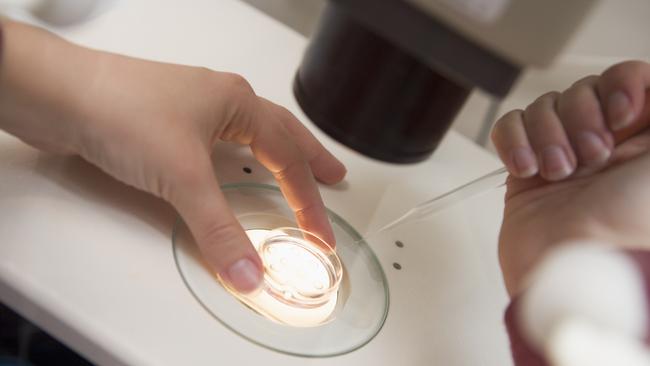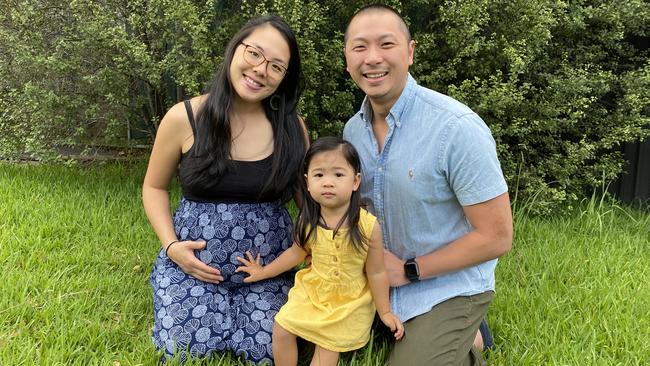More companies offering fertility benefits to workers
Australian workers are being paid to freeze their eggs and sperm as talent shortages force companies to develop more innovative employee benefits.
Careers
Don't miss out on the headlines from Careers. Followed categories will be added to My News.
Aussie workers are being paid to freeze their eggs and sperm as talent shortages force companies to develop more innovative employee benefits.
CRM company HubSpot and health tech firm harrison.ai are among those offering financial support to workers trying to conceive, in a bid to increase their family-friendly credentials.
What’s on offer?
harrison.ai’s gender-neutral Becoming a Parent policy provides up to $10,000 to workers for egg and sperm collection, as well as IVF treatment.
The fertility assistance is part of a range of family-focused benefits, including up to 16 weeks of paid parental leave (also available to parents who foster or adopt a child) and $1,000 ultrasound reimbursement, as well as grandparents and school-readiness leave.
Employees can also access up to 16 weeks of paid leave for pregnancy loss.
HubSpot also offers a benefit to women employees aged 32 years or older who wish to freeze their eggs but will not publicly reveal how much the benefit is worth.

Upping the ante
HubSpot APAC marketing director Kat Warboys believes as talent becomes increasingly scarce, more creative employee benefits are needed for companies to remain competitive.
“Gym memberships and free lunches are certainly a ‘nice to have’ but, to get the best out of your team, they need to feel truly supported in both a personal and professional capacity,’’ she says.
Warboys says women now make up half of Australia’s workforce, compared to less than a third in the 1970s, ``yet the biological implications of waiting for a career pique to start planning a family have not changed’’.
“We want women to feel confident and … empowered and have the option and flexibility to decide when to grow their careers and when to grow their families,’’ she says.
Walk the talk
harrison.ai chief executive officer Dr Aengus Tran says while many companies profess to being family-friendly, few offer tangible support to those needing help to conceive.

“Perhaps (employees) might not be ready to start a family right now or perhaps it’s a financial choice for them not to start a family right now – given the biological clock, preserving that option (of a family) is a great thing that we can do,’’ he says.
Chief people and culture officer Nicole Karagiannis says a “handful’’ of workers have inquired about the egg and sperm freezing and IVF assistance since the initiative was announced earlier this month.
Having experienced her own miscarriage, Karagiannis says having a suite of benefits that encapsulate the entire journey towards parenthood was particularly significant.
“Being able to say (to an employer after a miscarriage), ‘I’m not coming in because I need some time’, without feeling guilty about asking for that, is really important,’’ she says.
“It’s a no-brainer, from where I sit, in terms of the investment we are making in our people and the response to it has been just beautiful.’’
What the expert says
Robert Half director Nicole Gorton believes companies who support their employees in their personal lives will be preferred by jobseekers.
“While still rare, businesses that commit to not only supporting but investing in family planning exemplify themselves as an attractive employer for many people who want to start a family,’’ she says.
“Even for those not actively planning pregnancy, a company’s perk and benefit structure is reflective of their wider company culture so innovative and comprehensive perks and benefits are a beacon for a wider pool of potential candidates than strictly those seeking fertility support.”

Prioritising family is a real benefit
Working for a company that prioritises family is important to Jeremy Cheng, who is about to welcome his second child.
When his wife gives birth to their daughter in coming days, Chen will have access to 16 weeks of paid parental leave that can be taken over a two-year period.
He intends taking a week off immediately after the birth, returning to work when family come to stay and help with the new baby and two-year-old Charlotte.
He will then take further time off after his family leaves and again when his wife returns to work.
Cheng, head of finance at harrison.ai, says the extensive family benefits available to him are “unheard of’’ amongst his working friends.
The assistance for egg and sperm freezing, in particular, will make a huge difference to many workers trying to start a family, he says.
“Fortunately, for us, we had another really OK time having our second and we didn’t have to rely on egg-freezing and IVF and sperm-freezing,’’ Cheng says.
“But if we ever wanted to have a third child it is such a great benefit to look to explore, especially as we are in our mid 30s and our bodies are changing – (fertility) treatments could be an aid to that journey.’’


